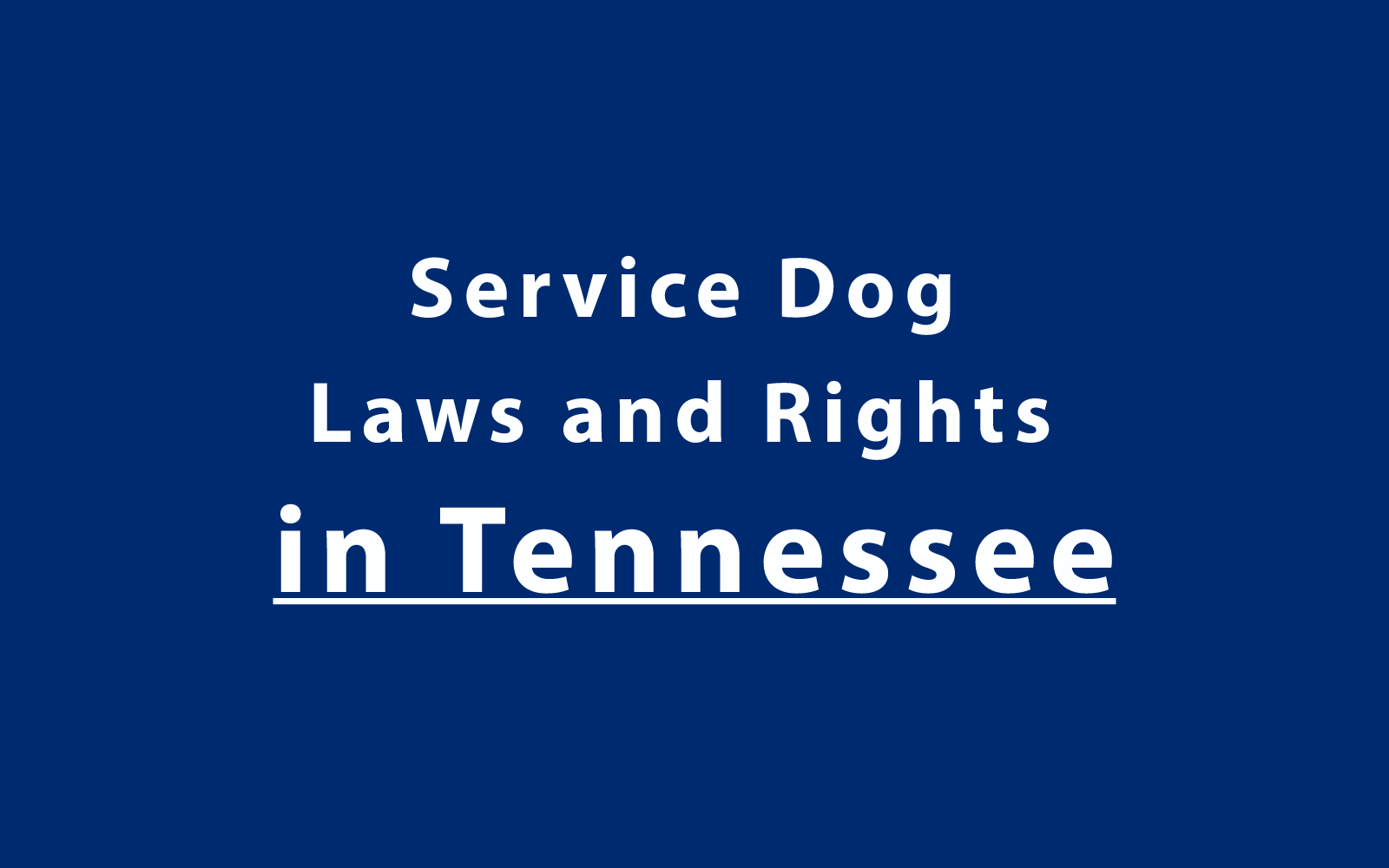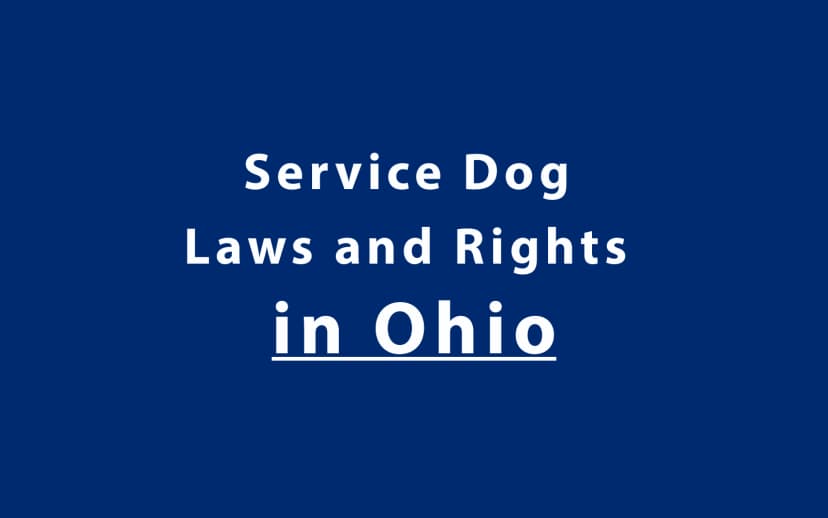Service Dog Laws and Rights in Tennessee

Service dogs provide critical support to individuals with disabilities, enabling greater independence, security, and daily functionality. In Tennessee, both federal and state laws establish protections for service dog handlers, ensuring that these vital companions can accompany their handlers in public, housing, travel, education, and employment settings.
This article breaks down the laws and rights for service dog users in Tennessee to help residents, landlords, employers, and business owners stay informed and compliant.
What Qualifies as a Service Dog in Tennessee
Under the Americans with Disabilities Act (ADA) and Tennessee Code § 62-7-112, a service dog is a dog that has been individually trained to perform tasks directly related to a person’s disability.
Examples of qualifying tasks:
• Guiding individuals with visual impairments
• Retrieving objects for those with mobility limitations
• Alerting to seizures, blood sugar levels, or panic attacks
• Interrupting harmful behaviors (common in psychiatric service dogs)
What does NOT qualify:
• Emotional Support Animals (ESAs)
• Therapy or comfort animals not trained for specific disability-related tasks
Tennessee aligns with federal law, meaning ESAs do not receive the same public access rights.
Public Access Rights in Tennessee
Tennessee law mirrors the ADA by allowing trained service dogs to accompany their handlers in all public places.
Covered locations include:
• Restaurants and grocery stores
• Retail shops and malls
• Public parks and recreational areas
• Schools, libraries, and government buildings
• Hotels and public transportation
What staff may ask:
1. Is the dog required because of a disability?
2. What task has the dog been trained to perform?
What staff may NOT do:
• Demand certification or identification
• Ask about the handler’s disability
• Request a demonstration of the dog’s abilities
Handler responsibilities include:
• Keeping the dog under control with a leash or command
• Ensuring the dog is housebroken
• Preventing disruptive or aggressive behavior
Access may be legally denied only if the dog is not under control or poses a health or safety risk.
Housing Rights in Tennessee
The Fair Housing Act (FHA) and state housing regulations ensure that individuals with service dogs are entitled to reasonable accommodation, even in properties with no-pet policies.
Key rights include:
• Landlords may not charge pet deposits or fees
• No breed, weight, or size restrictions can apply
• A landlord can request documentation only if the need is not obvious
Acceptable documentation must:
• Confirm the disability and the need for the service dog
• Be from a medical or mental health professional
Denial of reasonable accommodation may be reported to HUD or the Tennessee Human Rights Commission.
Employment Rights
Under the ADA Title I, employers in Tennessee must consider reasonable accommodations for employees with service dogs.
To initiate a request:
• Submit a written accommodation request
• Provide medical documentation if the disability is not apparent
• Engage in an interactive discussion with the employer
Employers may refuse only if:
• The accommodation creates an undue hardship
• The service dog creates a safety or operational issue
Complaints about workplace discrimination may be filed with the Equal Employment Opportunity Commission (EEOC) or the Tennessee Human Rights Commission.
Travel and Transportation Rights
Air Travel
The Air Carrier Access Act (ACAA) protects the rights of service dog handlers traveling by air. As of 2021, emotional support animals are no longer considered service animals.
Requirements include:
• Submitting the DOT Service Animal Transportation Form
• Keeping the dog under control and within handler’s foot space
Ground Transport in Tennessee
Service dogs must be allowed on:
• Public buses and trains
• Taxi services
• Rideshare platforms like Uber and Lyft
Denying access is a civil rights violation and may be reported to the Department of Transportation (DOT) or local agencies.
Service Dogs in Educational Institutions
K–12 Schools
Tennessee schools must comply with IDEA and Section 504 of the Rehabilitation Act. Schools must permit service dogs that support students with disabilities.
Requirements may include:
• Advance notice to the school administration
• Assurance that the dog is trained and under control
• Designated caregiver for the dog during school hours, if the child is unable
Colleges and Universities
Public and private institutions in Tennessee must comply with the ADA.
Coverage includes:
• Classrooms and labs
• Dormitories and cafeterias
• Libraries and recreational facilities
Students should contact the campus disability services office to initiate accommodation procedures.
Training and Registration of Service Dogs
Tennessee law does not require formal certification, licensing, or registration for service dogs. A service dog is valid if it is trained to perform tasks for a person with a disability.
Owner-training is permitted.
Handlers can train their own service dogs as long as the dog meets behavioral and task performance standards.
Best practices:
• Complete obedience and public access training
• Practice task-specific reliability
• Consider voluntary Public Access Testing (PAT)
AssistanceDogPartners.org offers:
• Optional service dog registration kits
Fraud and Misrepresentation
Tennessee Code § 39-16-304 makes it a Class B misdemeanor to knowingly misrepresent a pet as a service animal.
Fraud may include:
• Using service dog gear for an untrained pet
• Falsely stating a dog is a service dog to gain access
• Presenting fake registration cards or certificates
Penalties include:
• Fines up to $500
• Up to 6 months in jail
Impact: Misrepresentation undermines the credibility and safety of genuine service dog teams.
Suspected fraud can be reported to local law enforcement or the Tennessee Human Rights Commission.
State and Local Resources
• Tennessee Human Rights Commission – https://www.tn.gov/humanrights
• Disability Rights Tennessee – https://www.disabilityrightstn.org
• Tennessee Department of Education – Special Education Services
• Local trainers in Memphis, Nashville, Knoxville, and Chattanooga
Frequently Asked Questions (FAQs)
1. Is registration required for service dogs in Tennessee?
No. Registration is not required under federal or state law.
2. Are psychiatric service dogs protected?
Yes. As long as they are trained to perform tasks related to a mental health disability.
3. Can a landlord or business ask for proof?
No. Only the two ADA-compliant questions may be asked.
4. What if a service dog is denied access?
File a complaint with the U.S. DOJ, HUD, or Tennessee Human Rights Commission.
5. Can handlers train their own service dog?
Yes. Self-training is legally allowed and common.
Conclusion
Service dog handlers in Tennessee are protected under robust federal and state laws that uphold their rights in housing, employment, travel, public spaces, and education.
To ensure the best outcomes:
• Train service dogs with task reliability and public etiquette
• Use voluntary tools like the Public Access Test or registration kits
• Advocate respectfully and document incidents when rights are challenged
For professional training resources or to register your service dog, visit AssistanceDogPartners.org.



